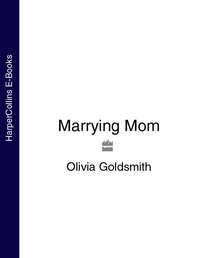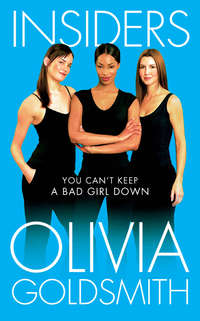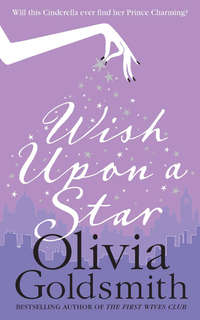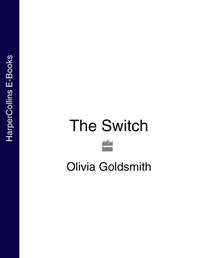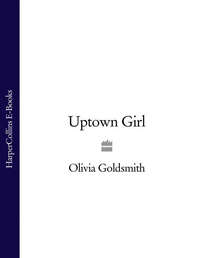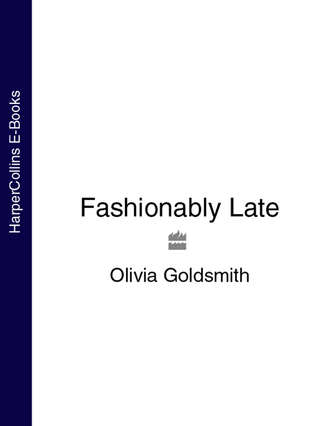
Полная версия
Fashionably Late
The Nuborg turned once more to Karen. ‘Which is better: elegance without sex appeal or sex appeal without elegance?’ Karen opened her mouth, but Mercedes’s long white hand took the reporter by her bony, black-clad shoulder and firmly turned her away. Karen sighed with relief. She knew that some day she would have to sit down and pretend an interest in those clichéd questions, but at least she didn’t have to do it right now. Later, she would kill Defina – but she’d be careful not to spoil the white dress.
‘Where do they get those questions from?’ Defina asked innocently, wrinkling her brow. She looked over at Karen. Then she got serious. ‘I’m sorry,’ she said. ‘I was just fooling around. I didn’t know she would …’
‘That’s okay. It’s nothing,’ Karen told her.
Defina widened her eyes. ‘Smile pretty at Nuclear Wintour,’ Defina told her, and Karen flashed a grin at Anna Wintour, arguably the most powerful woman in fashion publishing. Anna was shrewd and tough and glamorous and difficult. She had a lot of nicknames, but Mercedes, the most literate among them, always called her ‘The Wintour of our Discontent.’ Needless to say, Mercedes only said it behind Anna’s bony back.
At the next table, Karen could see Doris and Donald Fisher. He had started The Gap stores, and he, along with Peter Haas Senior of the Levi Strauss family, probably pushed more denim than anyone else in the world. With them was Bill Wolper of NormCo, the fashion conglomerate that was more successful than anyone else in the market. Everyone knew that big-time fashion wealth had come from the mass market. The real money had never been on Seventh Avenue. As Jeffrey reminded her over and over, ‘Henry Ford got rich making Fords, not Lincolns.’ It was only in the last dozen or so years that top-of-the-market Seventh Avenue American designers – who made Lincolns – had built enormous empires. And they had done it by moving out and down. Lincolns had been downgraded to Fords – bridge lines – for the malls. People like Ralph Lauren, Calvin Klein, and a half-dozen others had created fashion empires larger than any that had come before. Now Karen stood on the brink of an opportunity potentially as vast. And sometimes it frightened her.
But the faces around her table were all supportive ones. Aside from Jeffrey and Defina, she could smile at Mercedes, who had brought an obviously gay male friend. Mercedes came from the generation that always had male escorts for social events. Everyone knew Bernard was a lesbian (though no one ever mentioned it). Only Defina had the nerve to once refer to the woman as a ‘Mercedes diesel.’
Casey Robinson, their vice-president of marketing, sat next to Mercedes and he was with his gay companion Ray. Karen sighed again and had a flash of gratitude that she had met and married Jeffrey early on in her career. So many women in her business bemoaned the lack of heterosexual men in the industry.
Karen smiled at Casey, Mercedes, Defina, and the others. All of the people at the table tonight had helped her get there. When she learned she’d earned the Oakley Award, Karen had decided to have these people surround her and share in her success. She had not invited her family. They hadn’t contributed in the same way, and somehow their presence always complicated things. Just this once, Karen had decided to keep the night for herself, to share the event with her mother and sister only after the fact. She felt a little guilty about it, but as her friend Carl had explained, ‘The choice is between inviting them and spoiling your evening, or not inviting them and having a great night but feeling guilty. I say go with the guilt! Guilt is like a muscle. Learn to use it.’
As if the thought of Carl had conjured him up, Karen saw her tall, fat, balding friend making his way toward her. The table wouldn’t be complete without Carl. Since the days at South Side High School, back in Rockville Center, Long Island – which both she and Carl still called ‘Lawn Guylind’ – he had been her biggest cheerleader. Actually, her only cheerleader. Certainly, neither her mother nor her younger sister were supporters of Karen’s dream to make beautiful, fabulous, comfortable clothes. Belle was too practical, too critical for dreams, and poor Lisa, younger than Karen, needed support and couldn’t give any. Only Carl, with his crazy optimism, his sense of humor, and his mother’s sewing machine, had supported Karen’s ideas. He was her earliest fabricator and ally. Now his bulk crossed the last part of the Waldorf dance floor and he enveloped her in his big embrace.
‘Brava, brava, brava!’ he boomed, and smacked kisses on both her cheeks.
‘Grazia,’ Karen responded, exhausting all of her Italian vocabulary with that single word. It had been agony for her to learn French, which Jeffrey had insisted she do for her career. Karen was no Defina when it came to languages. She still spoke English with the heavy, adenoidal tones of Nostrand Avenue (where her family lived before her father could afford Rockville Center).
‘So how did you achieve this enormous success?’ Carl asked in a mock announcer voice, holding up a butter knife from the table setting as a faux microphone.
‘I guess I just kept my nose to the grindstone for a long time,’ she answered, too modestly and sweetly.
‘Oh, is that what made your nose like that?’ he asked. ‘Let’s get a picture of it.’ Carl popped out a tiny camera. He handed it to Jeffrey. ‘Yo, Defina. Get over here! I want a picture with the stars of the evening.’
Defina smiled and obliged, but Karen saw Jeffrey’s expression tighten. Why hadn’t Carl asked her husband too? Sometimes Carl could be incredibly undiplomatic. Karen was always aware the Jeffrey could be made to feel like an appendage, when the truth was he had made all her success possible. But to Jeffrey’s credit he obligingly held up the camera and squinted.
‘The Three Musketeers and their mid-life crisis,’ he said as he flashed the picture.
‘Isn’t that a book by Dumas?’ Carl cracked.
‘I think so,’ Defina said. ‘But I can never remember if it’s Dumas père, Dumas fils, or Dumas the Holy Ghost.’
‘Hey, guys, you’re confused,’ Karen explained. ‘Even I know that it’s Casper the Holy Ghost.’
Jeffrey shook his head at their foolishness. ‘Could you behave like celebrities instead of tourists for just one evening?’ he asked.
‘Speaking of celebrities, I saw John Kennedy Junior in the lobby,’ Carl whispered. ‘I nearly passed out. I swear, he is a real and present danger to the gay community. The boy could cause cardiac arrest.’ Carl began breathing hard with actual or feigned excitement. It was difficult to tell with Carl. ‘Oh, to be Daryl Hannah for just one night!’ he cried.
Karen rolled her eyes at him. ‘Behave,’ she warned. Carl was obsessed with the Kennedys, or pretended to be. He was probably the only person in the country who could name all the Kennedy cousins of this generation. It was a parlor trick he did, kind of like naming the wives of Henry the Eighth or the seven dwarves, except it took a lot longer.
By now most of the people in the ballroom had taken their seats, and Carl joined the Karen Kahn team at the table. He picked up a glass and when one of the waiters brought champagne, he cleared his throat and got serious. ‘Let us all toast this year’s winner of the coveted Oakley Award,’ he saluted. Karen was touched. Then, on cue, everyone at the table pulled out a slice of toast and lobbed them across the table at her – even the sedate Mercedes. Then they all collapsed in giggles. All except Jeffrey.
‘Jesus Christ!’ he said. He obviously hadn’t been privy to the gag. ‘A food fight at the Waldorf Astoria?’ He shook his head while Karen couldn’t stop laughing. Tears came to her eyes and she had to use a napkin to make sure she didn’t blot her mascara.
Suddenly the mistress of ceremonies, Leila Worth, began speaking from the podium set at the corner of the stage. ‘If I may ask for your attention,’ she cooed over a sound system that had to be set on supermax to be heard over the braying and whinnying of the mavins of couture. The fashion crowd was a loud one. At last they settled down.
The next part of the evening was a blur to Karen. There were the inedible couple of courses of food and the blah, blah, blah of several speakers who talked about the Oakley Awards and the industry and fund-raising. There was the buzz of conversation that rose to an almost unbearable din between each speaker, and the predictable music – some Lester Lannin knock-off band. Then the lights dimmed and Leila Worth got back behind the podium.
‘Tonight we are gathered to honor an American fashion great.’ Goose pimples ran up Karen’s arms and down her back. Was that her? She looked down at her plate of untouched chicken divan and wild rice. She was a fashion great? She didn’t know if she was thrilled, embarrassed, or upset. Maybe all three. Did Coco Chanel, Karen’s idol, feel ambivalent when she was fêted? Probably not, but then Chanel was a fashion great. Karen sat there feeling like both Miss America and an imposter. She tried to focus again on Leila’s words. After all, you didn’t get a Lifetime Achievement Award every day.
‘In the last twenty years, American fashion has become the fashion of the world,’ Leila was saying. Karen wondered how the French and Italian designers in the room felt about hearing that! If it wasn’t completely true, it was more true than it had ever been before. America was the place that had created a system that could move a designer’s vision out to virtually every corner of the world. It had taken three decades, but the Oakley Awards had been one of the mechanisms that had focused the attention of the fashion magazines and buyers on American designers. Leila could be excused the hyperbole.
‘Nobody represents American fashion, nobody knows American women, better than the designer we are here to honor tonight. In the last decade, the continuous flow of beautiful, luxurious, and wearable clothes has never stopped coming. No one has a greater mastery of form, a deeper understanding of the subtleties of color, and no one has been more industrious or creative in her search for the right material, the unique material, the original material, as Karen Kahn. Here are some examples.’
The spot focusing on Leila went black, and from out of the wings the parade of tall, gorgeous women began. Leila’s disembodied voice continued, describing some of the designs and their importance or originality. Now, in the semi-darkness, Karen knew what to do with her eyes. She drank in the spectacle – a collection of the work she had done in the last decade. Karen nodded at the big-shouldered sheath dress and matching knit jacket, the unconstructed blazer and sleek cropped pants, even the bias-cut silk knit evening gown, though evening wear had never been her strongest suit. The clothes on the models moved, they reflected the light, and they seemed both a decoration and an organic part of the beautiful bodies they draped. That was the trick, the riddle, that Karen was always trying to solve – how to conceal, reveal, and yet also be a natural extension of a woman’s body.
With most of these clothes, she thought, she had succeeded, and just for once, for this delicious moment, she could sit there and be happy with her work. She was no wunderkind – hell, she was hitting middle age – but if she felt that she’d been overlooked for years, now that she was finally being recognized she’d just consider it fashionably late. Karen could sense that the audience felt her vision, and when the last number – the previous season’s rich cocoa cardigan and legging outfit in wool with a simple chiffon undertunic – swirled off Leila called out her name. Karen rose effortlessly and walked across the gleaming empty dance floor to the stage.
The ovation sounded thunderous, but so was the sound of her own heartbeat in her ears. She hoped her hair looked all right; she knew that the satin pants and cashmere jacket she was wearing, the latter trimmed in satin banding, would catch the light and throw it back to the audience. She ascended the steps and turned toward the audience. The spots blinded her, but she was prepared and tried to look out at the darkness behind them without wincing. Leila hugged her, and the applause surrounded the two of them, a clichéd tableaux from every award ceremony that had ever come before. Karen looked over the room full of everyone who was anyone in the fashion world.
‘Thanks, friends,’ she began.
Jeffrey and she were getting ready to leave when Willie Artech approached their table. Willie was another designer, slightly younger than Karen, who also had been juggling an emerging Seventh Avenue business. About five years before he had been the hot guy, but underfinancing and missed delivery dates – an absolute mortal sin in the rag trade – had taken the luster off his name. So had AIDS. He stood there now, alone, in a tuxedo that was far too big for his wasted frame.
‘Congratulations, Karen,’ he said. He raised a glass unsteadily. ‘We who are about to die salute you.’
Everyone at the table, most of them in the process of gathering their things, stopped.
‘I’d hoped to get the award tonight, but homosexuality isn’t as fashionable as it once was.’ He shrugged. ‘Res ipsa loquitur. That’s Latin for “the facts speak for themselves.”’ Willie grinned, his head skull-like. ‘Pretty appropriate, don’t you think? A dead man speaking a dead language.’ His voice dropped, and he bent his head. ‘This was a hard night. I’d hoped to win. I don’t have any children. I would have liked to leave behind something that would make sure I’m remembered,’ he whispered.
‘I’m sorry, Willie,’ Karen murmured.
Carl stood up. His lover had died just two years ago. ‘Let’s go, Karen,’ he said. Jeffrey, who had been off to fetch coats, returned and helped Karen into hers. The table broke up, leaving Willie standing unsteadily alone.
Defina took Karen’s arm. ‘Don’t take it personally,’ she whispered. ‘You know how it is with gay men designers: it’s always “chére, chére la mére.” And tonight you got hit with his mother stuff.’
Despite Defina’s attempt at comfort, it was an unpleasant ending to a wonderful night and Karen felt an immediate stab of guilt. Somehow she knew how Willie Artech, the spectre at the table, felt.
‘Jesus,’ Carl said as they exited the room. ‘In the face of eternity, who could care so much about an award?’
But Karen, clutching the Oakley plaque, her hand once again protectively over her belly, could understand how someone might.
CHAPTER TWO
Barren Karen
The day after she received the Oakley Award, Karen sat numbly in Dr Goldman’s waiting room, trying to cope with his verdict. Irreparably infertile.
Somehow, she’d known all along. From the first, through all the tests, all the drugs, all the examinations, despite Jeffrey’s own doubts and his regimen of doctors, she’d known it was her and she’d known her condition was irrevocable.
It was odd, but the moment the doctor gave her the official news, Karen flashed on the idea of finding her real mother. But perhaps that wasn’t odd. Perhaps that was typical of barren female adult adoptees, she thought. How would she know? How many of us are there, she wondered? Are we a significant enough demographic lump to be charted as some baby-boomer subset? Have we already appeared on Oprah? Is there a twelve-step program or a support group for us?
She felt right now as if she could use some support. This was the punishment she got for being so happy only the night before. The Oakley Award, the glittering crowd, the happiness, all receded until it seemed as if it had happened some other year, or some other lifetime. It was dangerous to have been that happy. Here was the final proof.
After almost thirty months of trying, of unspontaneous, prescribed sex, painful, humiliating tests, medical specialists, and counseling, it had long been clear that something serious was wrong. Nothing to be so surprised about, she told herself. This was not unexpected. Here, at last, was the final verdict: irreparably infertile. No more searches for specialists, vaginal thermometers, doctor’s appointments in the middle of the day just at the exact moment she was ovulating. No more pain, expense, and bother. No more hope.
It stunned her.
Was it the hopelessness that put the idea of finding her real mother into her head? Karen didn’t know where the longing came from – this craving to feel whole that now a baby would clearly never satisfy. She hadn’t thought much about her real mother before – but now the need to search for her hit Karen in the stomach with a force that was almost nauseating.
She thought of Willie Artech – from all the events of last night, only his image didn’t seem to recede. Didn’t Jeffrey often accuse her of focusing on the bad things? Well, she couldn’t help what she focused on. Right now it was Willie Artech, dying, and wishing for children to make sure he was remembered.
But she didn’t want a child in order to be remembered – not exactly. It was more to connect her to the thread of life, to transform her and Jeffrey from a couple to a family. Well, for whatever reason she wanted a child, it wasn’t going to happen. Perhaps that was why, instead, she wanted her mother. Her real mother.
So here she sat in the ever-so-tastefully-decorated Park Avenue fertility clinic beside four women, all but one mirroring the pain and fear in her own eyes. Funny how they called the place a fertility clinic when only the sterile ones come here, she thought bitterly. Sterile and rich ones, she reminded herself. Dr Goldman had already cost what? Six or seven thousand? And this was how it ended. She winced. Money couldn’t cushion this blow, except to give you a glove-leather Barcelona chair to sit in while you tried not to lose your composure and your lunch right there, all over the Axminster carpet.
She felt like a completely different woman than the one who had been on the stage at the Waldorf only fifteen hours before. What had all of that meant? No memory of glory could lessen this pain.
She knew that she couldn’t tell her mother. Not either fact: that a baby was out of the question or that she wanted to search for her own natural mother. As always, Belle’s feelings came first. Belle was the punch line of that old mother-daughter joke: when the mother finds her daughter dead on the floor, a suicide, she cries out, ‘How could she do this to me?’ Oh yes, Belle would make a pity party out of this one. Belle only wanted to hear about Oakley Awards. She was comfortable around achievement, not failure.
Worse yet, Belle had been urging Karen and Jeffrey to have children for more years than Karen liked to remember. It would be awful now to have to admit that Belle was right. We should have tried to have a baby sooner, Karen thought. But I’ve been so wrapped up in my career. Carving out a place in the fashion world had been no day at the beach. And then, once I got a foot in the door, how could I not follow through? When my stuff really took off, with all the work, the success, and the travel, there just hadn’t been time. Babies, I figured, could always come later.
Except now they never would. Karen felt a stab of pain somewhere around her nonfunctioning female parts. Guilt? Phantom ovulation? She reminded herself that the doctor today had said that her infertility was not wholly age-related. ‘It’s quite possible that you’d never have been able to bear a child, although your condition is aggravated by age.’ Perhaps my guilt at waiting so long to try to conceive is misplaced, she told herself, and tried to believe it.
Not that her mother would ever believe that. Her mother would be more than eager to tell her not only that it was all her own fault but also that Belle had warned her. Belle wasn’t always right, but she was right often enough and vocal enough about it so that she seemed unassailable. Belle was a smart mother, but not a comforting one. Karen felt tears rise in her eyes, although she never cried. Instead, she took a steadying deep breath and blinked. At her age she was experienced enough to know that very few people had anything close to a good relationship with their parents, but at this moment she longed for a bosom she could weep on without constraint, blame, or guilt. No wonder men came to women for comfort: the lure of the breast was powerful. Yet Karen would never go to Belle for solace. Maybe it was no accident that Belle was so flat-chested. No lure there, Karen thought. Well, if men go to women for comfort, where do women go?
To their girlfriends. Karen had three: Lisa, her sister; Defina; and Carl, who was not anatomically female but could certainly pass for one in almost every other way. But Defina was still celebrating last night; Carl, though always ready to listen, was all the way over in Brooklyn; while at this moment Lisa was out on Long Island with Belle, waiting for Karen’s arrival. Karen sighed. Her stomach still felt as if it were about to heave. There would be no comfort until she got home to Jeffrey late tonight. And maybe not then. Because while he always reassured her on other issues, this was one he was too intimately involved in to be counted on. Their shared baby-making odyssey had tried his patience to the breaking point and put more of a strain on their marriage than she’d like to admit.
‘Mrs Kahn?’ there was a question in the nurse’s voice, and Karen knew she’d have to act as if the room wasn’t spinning around her. But could she get up from the damn chair without blowing chunks across the glossy magazines on the coffee table? Maybe it would pass for morning sickness. More like mourning sickness, Karen realized. The woman sitting beside her, the only one not appearing frightened, the one who was very obviously pregnant, turned her blonde head and raised her almost transparent eyebrows. She was reading the style section of the New York Times, which carried a long report on the Oakley Award. Yes, she was putting it together, Karen could see. Yes, I am Karen Kahn. That Mrs Kahn. Great, Karen thought. Now she’d get to read about this visit in tomorrow’s Liz Smith column. She could just picture the item: ‘What top Seventh Avenue designer was seen at New York’s chicest infertility clinic?’
She looked back at the pregnant woman beside her. There ought to be a law that infertility clinics sent their success stories elsewhere instead of flaunting them in front of us, the barren ones, Karen thought. There also ought to be a law that famous people, or even semi-famous ones, could not be stared at when they were in moments of extreme pain. Karen sighed. Yeah, and while she was at it, why not pass a law against childhood leukemia and racial cleansing? This was the downside of celebrity, Karen. Live with it.
Get up, she told herself. Don’t puke, don’t trip, and don’t give this albino breeding bitch a chance to ask if you can get maternity clothes for her at wholesale. Somehow Karen’s knees found the strength to propel her upward and she crossed the room in three long strides. Karen was a big girl, tall, with long legs, and – despite constant dieting attempts – she was far from thin. That was why she knew how to design clothes that minimized thighs and camouflaged waistlines. Now, she clutched her layered cashmere sweaters and matching shawl around her as if they were armor.
‘Yes?’ she asked the nurse who gave her a professionally bright smile as if it didn’t matter that this was the worst day of Karen’s life. The best night, followed by the worst day. Twenty-four rocky hours. ‘That will be seven hundred and forty-three dollars,’ the woman said pleasantly, without shame. Karen unzipped her De Vecchi bag and pulled out her checkbook. She fumbled for her Mont Blanc but couldn’t find it. The nurse, still smiling brightly, slipped her a Bic. Karen noticed her own hands were shaking. She tried to write out ‘7’ on the amount line and it looked more like a snake that had been mashed on the roadway than a number. It was hopeless. She tore the check out and into two pieces, threw the cheap pen on the desk, and chucked the pigskin checkbook back into her bag.


